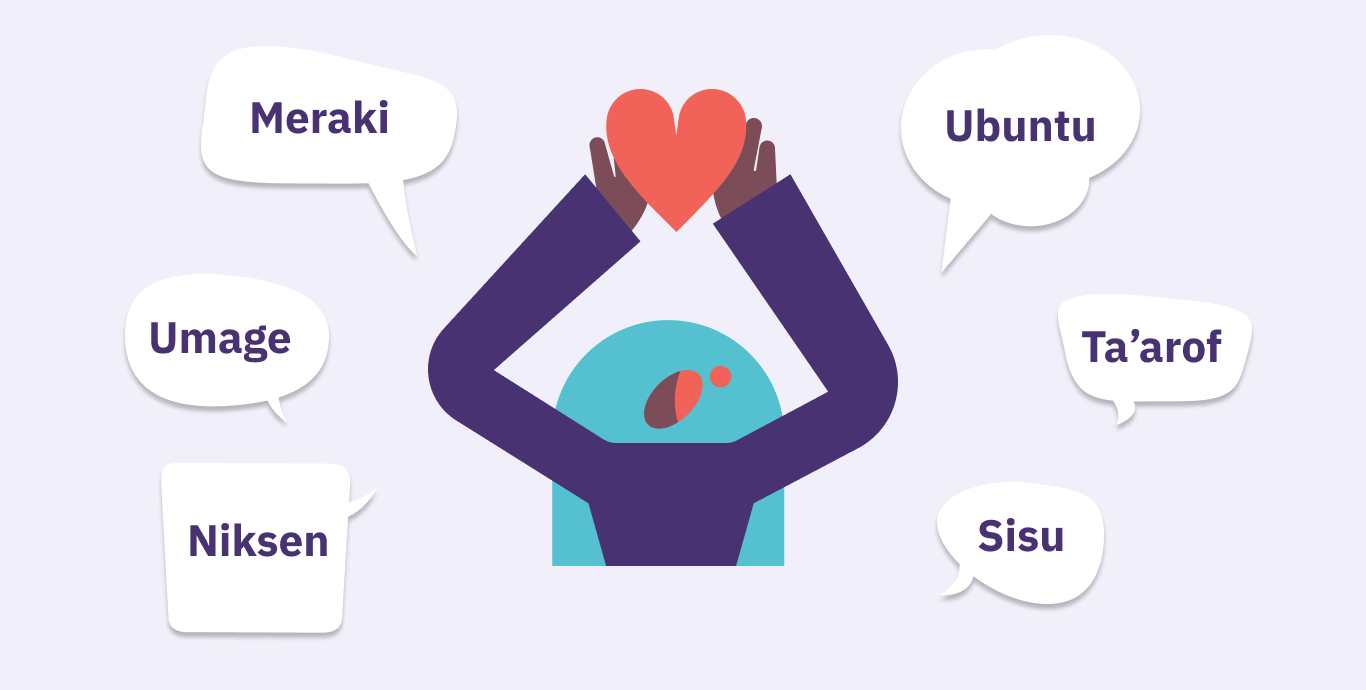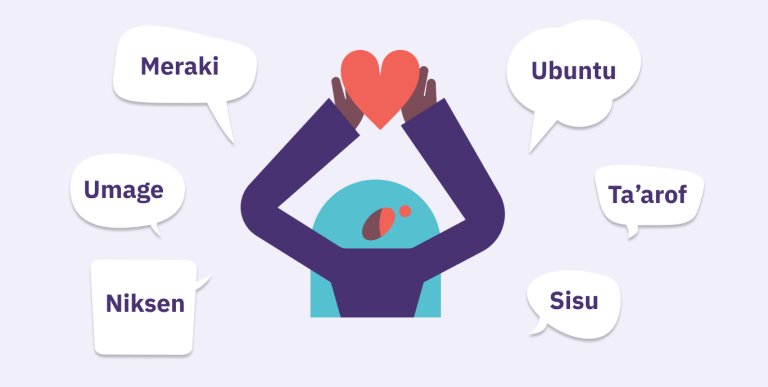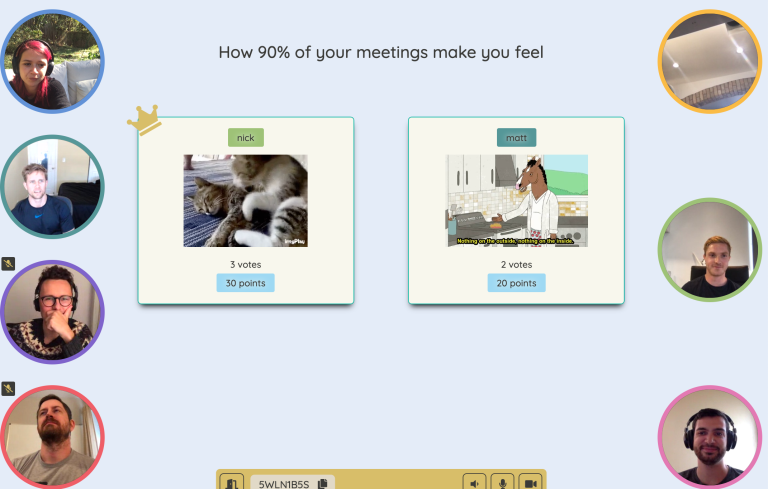23 Untranslatable Words to Help You Work Smarter

There are some words that simply defy translation. They speak to something deeper and more soulful, something specific in the experience of the culture they’re forged in, that prevents direct comparison.
In the language of my home country of Wales, that’s hiraeth – a melancholy and nostalgic longing for a home that no longer exists, or never did.
Languages give us an insight into different ways of thinking about the world.
And untranslatable words reveal the ideas and concepts a culture finds important enough to deserve words of their own.
This blog covers 23 untranslatable words from around the world that inspire us to have more fulfilling work lives!
1. Meraki (Greek)
The Greek word Meraki means to do tasks with soul, creativity and love
Ever found yourself accessing that elusive state of flow? Everything fits right into place.
Well, the Greek verb/adverb meraki refers to something rather similar.
Meraki is used by Greeks to describe scenarios when a person has really put a part of themselves into something. It could be cooking that comes from the heart, composing a piece of music that comes straight from the soul, or writing an article that expresses thoughts openly, honestly, and vulnerably.
Meraki highlights the intimate connection between humans and their work.
2. Nunchi (Korean)
The Korean word Nunchi refers to the subtle art of paying close attention to someone else’s mood
A slight shift of weight, a fleeting glance or a tone of voice may be enough to set the nunchi master’s mind in motion.
This Korean word – originating from the Chinese characters eye-force power 眼勢 – refers to the practice of subtly listening and observing others to gauge their mood.
South Korea is a high-context culture which means that communication is more indirect and relies more on understanding context, body language, tone of voice, etc.
That makes nunchi a vital skill.
Even in low-context cultures like the USA, Germany and the United Kingdom, we can learn from Nunchi and use this practice of observation to be more empathetic with our colleagues.
3. Taararadhin (Arabic)
The Arabic word Taararadhin means a form of compromise in which everyone wins
Compromise doesn’t have to end with both parties going away with less than they wanted. At least according to the Arabic language.
Taararadhin refers to a form of compromise where both sides go away happy. It transforms the rather dominant Western view that compromise involves giving up ground, to celebrate the end result – a solution where both parties stand to benefit.
Taararadhin encapsulates the true nature of a compromise agreement. Re-framing compromises as a win for everyone can help us all have more productive discussions at home or at work.
4. Kintsugi (Japanese)
The Japanese concept of Kintsugi teaches us to embrace damage and celebrate our scars.
If we’ve failed at something or accidentally caused ourselves or others harm through our actions, our knee-jerk reaction is to hide the damage. By contrast, the concept of kintsugi encourages us to recognise our scars as part of our history and character.
The general concept of kintsugi (gold joinery) evolves from the 15th-century process of repairing broken pottery or homeware with gold joinery – making breakages beautiful and celebrating them as part of an object’s unique history.
We all face setbacks in our lives and bear different scars – the concept of kintsugi encourages us to value and celebrate those experiences instead of hiding them.
Because in the end, it’s our scars that make us who we are.
5. Sisu (Finnish)
The Finnish word Sisu refers to a fierce determination in the face of adversity
For hardy Finns, the word “determination” is not enough. That’s why they have the word sisu, which sums up a part of their national character.
Sisu means grit, resilience, bravery, strength and stoicism all combined together – and it originates from the Finnish word for “guts” or “intestines”.
It generally refers to an extraordinary effort and drive to overcome extreme adversity. It’s the daring needed to complete a risky or even life-threatening task against the odds. Think single-handedly sailing your dinghy out of a storm or making a long hike over a glacier with dwindling supplies of food and water.
And while those scenarios probably won’t crop up in your daily work, the term is useful as an aspirational quality of keeping on keeping on, when it would be easier to simply give up.
6. Kaizen (Japanese)
The Japanese word Kaizen encapsulates the concept of continuous improvement at work or in life.
Almost everyone is striving to be better today than they were yesterday. But most countries don’t have a specific word for that… except for Japan.
The term kaizen encompasses a range of different practices and ideas all geared towards reflecting, improving, evaluating and iterating.
The term originated when Japan was industrialising after World War Two and wanted to enhance production efficiency day by day. It has since become a key term in agile project management methodologies and is the goal of agile retrospective meetings.
7. Lagom (Swedish)
The Swedish word Lagom means “just the right amount of a thing”
Way back in 700BC, the Greek poet Hesiod quipped that “moderation is best in all things”. In Sweden they cut that sentiment down into one word – lagom.
Lagom is just the right balance of a thing – not too much, not too little, just the perfect amount. It could refer to something as finding just the right balance of sugar to put in your tea. But it needn’t refer to only small things either.
Finding balance in work is something many people struggle with. Too often people are overworked or under-worked, leading to burnout or rust-out. In a work environment, lagom might mean finding the perfect workload or striking a good balance between time spent in meetings and time doing deep work.
8. Fargin (Yiddish)
The Yiddish word Fargin means “wholehearted appreciation of another person’s success”
This delightful Yiddish word refers to the heartfelt celebration of someone else’s success, without any conceitedness or envy. It’s the opposite of schadenfreude – German for the pleasure taken from someone else’s downfall.
Teams work best when everyone can lift each other up and the whole team has the psychological safety to freely give and receive recognition – without any office politics.
9 Ubuntu (Zulu)
The Zulu word Ubuntu refers to “the sense that I am because you are”.
The word ubuntu derives from the delightful Zulu phrase “umuntu ngumuntu ngabantu“, which means that a person is a person only because of other people.
The word ubuntu covers a range of different ideas – from community, an understanding that we are all connected to each other, and that individuals are part of a greater whole.
In organisations, humans rely on each other to build things and create experiences that are greater than the sum of their parts.
The concept of ubuntu can add a sense of grounded-ness to work.
Ubuntu says, we have a shared existence and I need you, just as you need me, to thrive. It takes ego out of the equation. And that’s something we can all benefit from to form strong and resilient communities where everyone’s contribution is heard and respected.
10. Arbejdsglæde (Danish)
The Danish word Arbejdsglæde refers to “wellbeing at work and the satisfaction of a job well done”
The Danes take job satisfaction so seriously they have a single word for it – derived from the words “arbejde” meaning work and “glaede” meaning gladness or happiness. From the country with the best work life balance in the OECD, we had better sit up and listen.
For Danes, arbejdsglæde encapsulates everything from flexible hours to flat organisational structures, low power distance, and a focus on helping employees to thrive – not just survive.
But more than simply ‘job satisfaction’ arbejdsglæde can also signify the satisfaction of a job well done at the end of a hard day of graft. Seems like the Northern Europeans might be onto something because Estonians also have a word with the same meaning – töörõõm.
11. Ta’arof (Persian)
The Persian word Ta’arof refers to a form of politeness that emphasises friendship and hospitality
Ta’arof refers to a complex web of social norms that prioritises friendship and hospitality above all else. The Iranian norm of refusing food two or three times before accepting is part of ta’arof – and it can be rather confusing for foreigners visiting the country.
Iran is a high-context culture, which means that etiquette forms a part of communication that carries meaning. Ta’arof encourages us to see the humanity in others – to prize friendship above all else and to be hospitable to others. It could mean taking that extra time to help out a colleague even when you are very busy. Or going out of your way to serve another even at your own expense.
Ta’arof teaches us to value people as human beings above thinking about people in terms of what they can do for you. It teaches us to form strong friendships with the people in our lives and to respectfully give more than we take.
12. Shodo 書道 (Japanese)
The Japanese word Shodo (書道) refers to the art of committing pen to paper.
Shodo is the Japanese word for traditional calligraphy, but the word carries a deeper meaning to do with commitment and action.
If you’ve ever tried writing traditional Japanese calligraphy with ink and a brush you’ll know there isn’t much of an opportunity for do-overs. The ink hits the paper and soaks in. Brush strokes need to be quick and decisive if they’re to be well-defined on the page.
The concept of shodo can be interpreted as a decisiveness or commitment to a course of action – the idea that once you’ve put the pen to paper, you will continue until you’ve finished your stroke. Think of it like an internal commitment to a course of action, perhaps even a bias for action.
13. Fika (Swedish)
The Swedish word Fika refers to a daily ritual of socializing over cake and coffee.
Fika is the Swedish word for taking a timeout with your colleagues and bonding over a hot drink and sweet treat.
At the mere mention of Fika I can smell the aroma of freshly roasted coffee and cinnamon buns straight out of the oven.
Taking the time to get a coffee and have a casual conversation with a friend is one of life’s small pleasures. In Sweden they make it a daily occurrence.
For Swedes, Fika isn’t simply coffee and a cake. It’s an important time for social bonding and togetherness that takes on a larger meaning.
Why not try building a Fika habit with your own team?
14. Querencia (Spanish)
The Spanish word Querencia refers to a safe place you draw strength from.
In the Spanish tradition of bullfighting, a querencia is the place in the ring where a bull takes its stand. Often a bull will wait a few seconds in its querencia to build up energy before its next charge.
A querencia can be translated more broadly as our home or an arena where we feel fully ourselves. It’s the place from which we draw inner strength or simply “A place in which we know exactly who we are [and] from which we speak our deepest beliefs.”
Staking out your own querencia and understanding where you take strength from can help individuals and teams build resilience to draw on in tough times.
15. Ataraxia (Ancient Greek)
The Greek word Ataraxia means an “aspirational state of calm or freedom from worry”
Ataraxia is a state of simultaneous freedom and acceptance used by the Ancient Greeks. And it’s a core tenet of Greek stoicism.
It is the freedom from worry or anxiety born from acceptance of fate.
The concept of ataraxia is echoed in the Christian Serenity prayer written in the 1930s:
God, grant me the serenity to accept the things I cannot change, courage to change the things I can, and wisdom to know the difference.
When something is beyond your control, ataraxia is the power to accept it and remain calm, no matter how difficult the situation may be.
Understanding and employing this term can help us to focus our energy into the things we have the power to change and accept the things we cannot.
16. Koselig (Swedish)
The Swedish word Koselig refers to “the art of finding light in the darkness”.
Kiruna is the most northerly town in Sweden. On the shortest day of the year, the sun rises at around 11:00 am and sets again at 12:30 pm. So it’s safe to say the Swedes have their fair share of darkness.
The Swedish term Koselig refers to the art of finding light in the darkness. The word can be used as a noun (koselig) and a verb (kose) – which is similar to ‘cozy’ in English.
Koselig is about finding ways of getting through the hard months of the year. It may be dark outside, but you can create the light inside.
Taken in abstract, the term can be used to think about how we can remain resilient when we are struggling.
When work feels difficult, what inner light can we find to make it better?
17. Tokimeku (Japanese)
Tokimeku means “to spark joy or make the heart flutter”.
Tokimeku is commonly translated into “spark joy” due to the influence of Marie Kondo and her Kon Mari Method, but it translates directly as “beat” or “throb”.
In Japanese it corresponds to the rush of joy at something positive and the anxiety or expectation that comes when hopeful of good news. Just as your favorite coffee mug, coziest sweater or pen and notebook may spark joy, so can different elements of your work and relationships.
Taking time to recognise the parts of your work-life that give you this feeling can help you feel more aligned with your work and understand where to get that hit of joy when you most need it.
18. Umage (Danish)
Umage means to go the extra mile or make an exceptional effort for someone else’s benefit.
Umage (pronounced oo-may) is all about putting in that extra bit of effort to give someone else joy. That may be in our work, our homes, or our relationships. Umage is about pulling on that extra source of strength inside you to give an exceptional performance or great experience to another.
In our work and home lives it can be easy to start getting into a routine of going through the motions. And it’s easy to shrug off work or chores and say “it’s good enough”. But umage is about going that extra mile to be even better. It’s not perfectionism and it’s not over-work, but it’s about being the best version of yourself.
If you know that a little extra effort on a task or relationship will brighten up someone else’s day, then why not make it?
19. Ikigai (Japanese)
Ikigai is the Japanese word for a raison d’etre or reason for being. It’s what makes you get up in the morning.
In that sense, it’s kind of where Japanese Buddhism meets French existentialism.
It’s the Japanese raison d’etre and dates all the way back to the Heian period (794-1185).
Having a defined reason for being means answering the question of “why” you do a certain thing and “how” you see the value in it. If you don’t understand why you are doing something or how it adds value, it’s really hard to get up in the morning and do it.
When teams have a strong understanding of why they are doing things and can see the direct value, the ikigai will be strong.
20. Hygge (Danish)
Hygge is a feeling of warmth and comfort that fosters well-being.
Work doesn’t have to be a slog day in and day out. There’s always hard work to be done, but embracing the idea of hygge in your work environment can help you associate work with a good mood and warm feelings.
When thinking of hygge it’s easy to start dreaming about Danish huts in the forest, a roasting fire, and a warm cup of chai (or something stronger). Hygge is really about creating a level of comfort in life that improves your well-being and sense of contentment.
It’s about finding joy in the little things.
Something as simple as setting up a work-space that makes you feel good and you want to spend time in counts as hygge.
But we wouldn’t say no to a log-fire and a warm drink either; if you’re offering.
21. Niksen (Dutch)
Niksen means to do nothing and empty one’s mind.
One in three people say they struggle to switch off from work at the end of the day. If you’re one of those folks – and I certainly am – the Dutch have come to the rescue. The Dutch verb niksen is all about embracing…err, nothing.
It’s a relaxation technique that places value in emptying your mind of everything. Not in the way that you’d frantically empty your closet to find something you’ve lost, but more in the way of letting everything drift away for an hour or two.
In a society that obsesses over productivity and casts shame on laziness, niksen is a powerful way of giving yourself permission to simply do nothing. Think of it like a mental palette cleanser. Free from guilt, free from thoughts, niksen gives you time to recharge your mind and your soul.
22. Friluftsliv (Norwegian)
Friluftsliv is the Norwegian concept of outdoor living.
Did you know that in Norway, children spend 75 percent of their kindergarten time outdoors? Compare that to the average worker, who no doubt spends 75 percent or more of their working hours indoors. Friluftsliv means “free air life”.
It was first coined by playwright Fredrik Ibsen back in his 1859 poem “On the Heights”. Since then it’s become a staple of Norwegian living.
Friluftsliv recognises the healing power of nature and the importance of getting outdoors and being in the elements. Similar concepts exist in other cultures. For example, in Japan where shinrin-yoku refers to the act of “forest bathing” – immersing oneself in nature without a particular destination. Both are meant to improve wellbeing.
Friluftsliv reminds us how important it is to get out of the house and live where we evolved to be – in nature. So next time you have a call, why not take a walk at the same time. Or even better, set a hard end time to your work and decompress immediately by getting outdoors.
23. Fredagsmys (Swedish)
Fredagsmys refers to that special Friday feeling when you know you can relax over the weekend.
In the US and UK we sometimes talk about “that Friday feeling”. It’s the energy you feel when the weekend is tantalisingly close. There’s some excitement in the air and anticipation of what’s ahead – a Friday evening relaxing on the couch with your loved-ones and cooking up a wholesome dinner.
In Sweden there’s a word for that – fredagsmys.
And there’s also a fredagsmys song…
Celebrating Friday by winding down the week, recapping your successes, and spending a ‘cozy friday evening’ with your loved ones is a great tradition for closing out the week.
Norway (fredagskos) and Denmark (fredagshygge) also have this tradition.
Becoming wiser with words from around the world
I hope this list of words helps you find the sisu to achieve arbejdsglæde. Perhaps through a casual daily fika with your colleagues, by thinking about what querencia means to you, or by embracing the concept of ataraxia for a more emotionally balanced approach to work!
These words from around the world all provide a novel trigger to rethink parts of our working lives.
We can mix and match concepts that work for us from each culture towards a new philosophy of work that delivers calm, strength, purpose, and personal fulfilment.
Did we miss any great words from your culture?
Please let us know so we can add them in!








